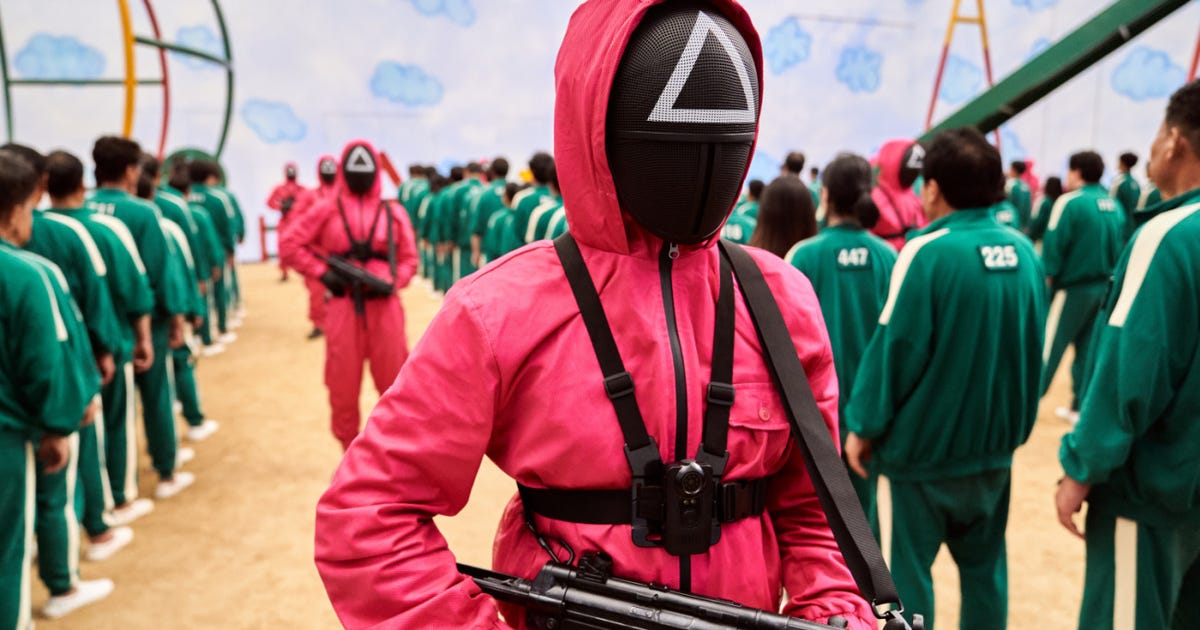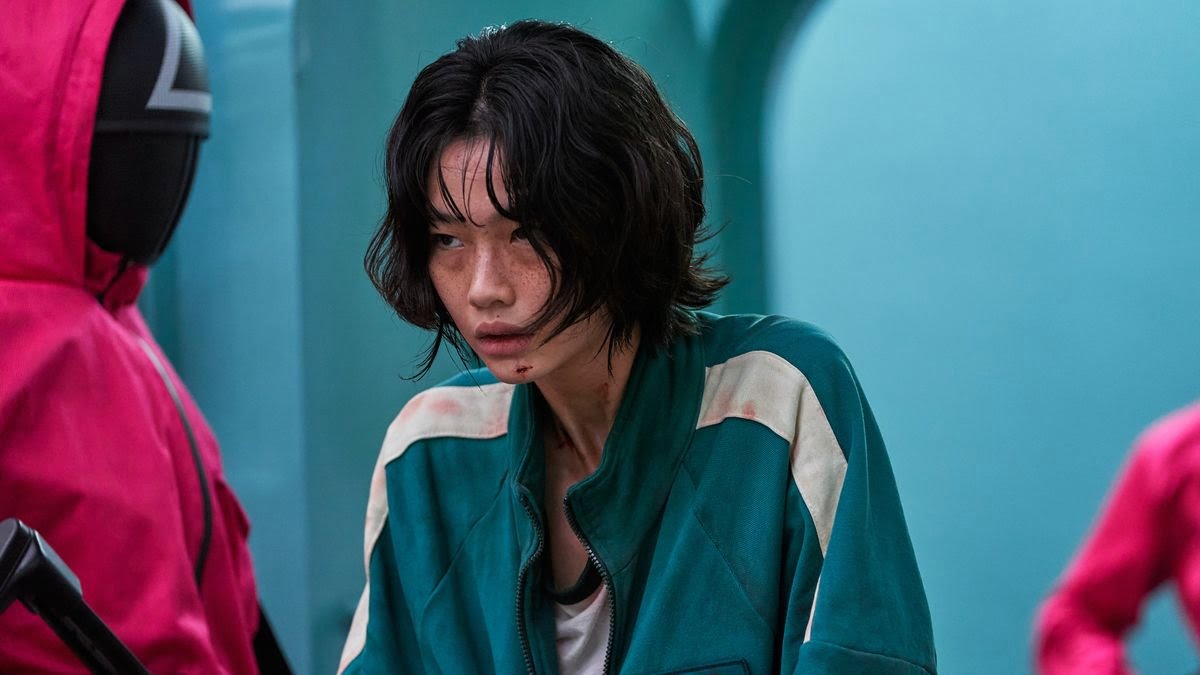Hwang Dong-hyuk directorial Squid Game is a South Korean dystopian drama series on Netflix that features cash-strapped contestants playing deadly games to win 45.6 billion won (approximately 2 billion rupees). The protagonist, Seong Gi-hun, is a divorced gambling addict who lives with his elderly mother. Squid Game follows his journey as he takes part in the Game that commands the boundary between life and death, wealth and poverty.
Hwang Dong-hyuk directorial Squid Game is a South Korean dystopian drama series on Netflix that features cash-strapped contestants playing deadly games to win 45.6 billion won (approximately 2 billion rupees). The protagonist, Seong Gi-hun, is a divorced gambling addict who lives with his elderly mother. Squid Game follows his journey as he takes part in the Game that commands the boundary between life and death, wealth and poverty.
When Gi-hun is approached by a mysterious salesman who offers to pay 100,000 for every round of a game called Ddakji, he readily agrees. The rules are simple: both participants have folded pieces of paper. After the salesman keeps his folded paper on the ground, Gi-hun needs to use his folded piece to hit the salesman’s. If the piece on the ground flips, he gets 100,000 won. If, however, the salesman wins in his attempt, Gi-hun needs to supply the same amount to him.
Also read: Analysing The Gendered Poverty, Homelessness & Single Motherhood In Netflix’s Maid
In lieu of money, the salesman offers to slap Gi-hun and continue the game without the burden of debt. By exhibiting the extent to which financially vulnerable people become willing to endanger their lives for money, the game of Ddakji between Gi-hun and the salesman introduces the politics of power and authority that plague the entire series of Squid Game.

Later, Gi-hun calls the number on the business card given to him by the salesman, following which he ends up in a dormitory with 455 other players. Nobody knows the dangers involved. It is important to remember that Gi-hun does not ‘choose’ to participate: his choice becomes a necessity when the impending threat of his young daughter’s migration to the US gets complemented by his mother’s medical condition, forcing him to furnish money.
In Squid Game, in the remote island where the Game is conducted, the financial incentive prompts the contestants to play the first game, namely ‘Red Light, Green Light.’ When they realise that those who lose are immediately killed, chaos erupts, leading to the deaths of more than half of the players. They leave the premises after the majority votes for the Game to end.
Many, however, return when they realise that the outside world does not offer real alternatives for socio-economic upliftment. Voluntary participation in the Game maintains the illusion of ‘choice.’ The contestants hardly realise that the makers of the Game do not offer them a life-changing opportunity, but rather exploit their inability to pay back their debts and compel them to take part in a catastrophic game tournament.

That the economic realities of the contestants force them to participate in the Game, ruthlessly betray and kill their peers, and risk their own lives illustrate the realities of the personal-debt crisis in South Korea. However, even the supposedly emancipatory Game does not offer an alternative. The contestants continue to risk their lives to get money, showing the consequences of absent welfare systems designed to guarantee human rights in spite of an individual’s financial position. Morgan Ome cogently remarks: “For the players, the daily humiliations of being poor are a worse fate than risking death.”
The public hanging of the Doctor and his co-conspirators makes the Game appear fair, which it is. Yet fairness cannot be equated with equality and validity. For instance, men’s unwillingness to pair with women players before the Tug-of-War game is indicative of the persistence of gender inequalities on account of continued belief in stereotypical assumptions arising out of the biological construct of gender. Similarly, in the “Gganbu” episode in Squid Game , almost all contestants except Gi-hun avoid pairing with Oh Il-nam, an elderly man with brain tumour, assuming him to be a weak partner.
Further, the relevance of the games played by contestants remains ambiguous. The makers of the Game have simply recreated children’s games in a fashion to make the experience threatening and fatal for purposes of elimination. The anonymous coordinators of the games often insist on fairness, but it is significant to question the validity of these games. How does cutting a stamped shape out of a dalgona qualify someone to proceed to the next round? Why does a game supposedly predicated on the foundations of ‘fairness’ force players to cross a high bridge with varying glass material without offering them any opportunity to differentiate between normal and tempered glass? Given the pervasiveness of predatory lending practices, why are some people chosen over others for participation in the Game?
Also read: Sex Education’s Best Lesson: Men’s Character Growth Not Just For Romantic Gratification
Perhaps the VIPS who invest their time and resources in contestants of the annually organised Game perceive the dystopian game tournament as a strategy to solve global poverty. In theory, this appears plausible: identify the most vulnerable people whose desperation for survival makes degradation an acceptable outcome. Play Ddakji to establish mutual trust. Invite them to the Game and watch them leave. The contestants who return are the ideal participants, for they recognise death a possibility within and outside the walls in which they are locked. Make marginalised people fight against each other so that one of them can win blood money. Give the winner a life-changing financial reward. Kill the losers. The adoption of such a strategy — if devised by international actors who qualify as VIPs — in real-life policymaking can be disastrous, to say the least.

The ‘do-or-die’ expectation of a capitalist economic system is severely flawed. By foisting the onus of systemic change on individuals, the rhetoric of capitalism completely neglects the collective responsibility of institutions and authorities toward resolving social inequalities. Capitalist infrastructures inevitably fail because of their incorrect assumption that the defeat of private hardship is what will bring about collective social transformation.
Squid Game demonstrates the maintenance of oppression even as incredibly wealthy people across the world come together to design a fatal game tournament that ‘frees’ one ‘winner’ from the calamities confronted within a rigid class system founded on privilege. The Game in the series only serves the purpose of entertainment to ultra-rich ‘VIPs’ who are bored. What their socio-economic privilege prevents them from acknowledging is the fact that their flawed game tournament does little to address the societal barriers that create and sustain divides among people.
The Game in Squid Game only serves the purpose of entertainment to ultra-rich ‘VIPs’ who are bored. What their socio-economic privilege prevents them from acknowledging is the fact that their flawed game tournament does little to address the societal barriers that create and sustain divides among people.
Writing about the dystopian series on Bitch, Jennifer Chang aptly sums up the mainstream comparison of Squid Game to Parasite: “Both are critiques of a rigid class system disguised as a meritocracy that reveal the messy implications of deeming certain people ‘deserving’ of a good life.”

An honest exhibition of inhuman conditions and practices enables Squid Game to render a critical reflection on the precarity of existing politico-economic systems. The conclusion reveals that Gi-hun is not the winner: the real winners of the Game can only be the ultra-rich VIPs who maintain dominant modes of oppression under the guise of ‘opportunity.’
An honest exhibition of inhuman conditions and practices enables Squid Game to render a critical reflection on the precarity of existing politico-economic systems. The conclusion reveals that Gi-hun is not the winner: the real winners of the Game can only be the ultra-rich VIPs who maintain dominant modes of oppression under the guise of ‘opportunity.’ Squid Game is an impeccably filmed series that magnifies the horror of its thematic concerns with visual modes of cinematographic presentation, particularly the grain composition in wide shots.
That said, let’s keep in mind the fact that Netflix is itself a problematic mediator of entertainment and infotainment. While some Netflix specials promote the voices of comedians from diverse backgrounds, others sustain oppressive vocabularies in the name of ‘freedom of expression’: Dave Chapelle’s transphobic comments in his recent Netflix special is one of the many examples that shows how apolitical Netflix actually is.
Featured image source: Polygon
About the author(s)
Mridula Sharma is a researcher and a writer. Her work lies in the intersection of feminist theory, postcolonial studies, and popular culture.





